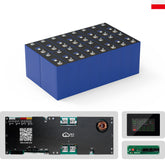Leitfaden zur Auswahl der besten Lithium-Golfwagenbatterie
Die Wahl der richtigen Lithium-Golfwagenbatterie ist eine der wichtigsten Entscheidungen für jeden Golfwagenbesitzer oder Flottenmanager. Eine hochwertige Batterie sorgt nicht nur für optimale Leistung, sondern minimiert auch den Wartungsaufwand, verlängert die Lebensdauer und spart langfristig Geld. Bei der Vielzahl an Marken und Spezifikationen auf dem Markt kann es schwierig sein, die Vorteile einer Lithium-Golfwagenbatterie zu erkennen. In diesem ultimativen Leitfaden führen wir Sie durch alle wichtigen Faktoren – von der Spannung und Amperestundenzahl bis hin zu BMS-Systemen und Garantieleistungen.
- Die Grundlagen einer Lithium-Golfwagenbatterie verstehen
- Wichtige Spezifikationen, die bei einer Lithium-Golfwagenbatterie zu beachten sind
- Evaluierung des Batteriemanagementsystems BMS
- Vergleich der Top-Marken für Lithium-Golfwagenbatterien
- Überlegungen zur Installation von Lithium-Golfwagenbatterien
- Reichweitenerwartungen und Leistung in der Praxis
- Sicherheitsmerkmale einer Lithium-Golfwagenbatterie
- Kosten vs. Wert: Lohnt sich eine Lithium-Golfwagenbatterie?
- Garantie- und Supportangelegenheiten
- Umweltauswirkungen und Recycling
- Zukünftige Trends bei Lithium-Golfwagenbatterien
- Wartungstipps für eine Lithium-Golfwagenbatterie
- Zusammenfassung: Auswahl der besten Lithium-Golfwagenbatterie
Die Grundlagen einer Lithium-Golfwagenbatterie verstehen
Was macht Lithium anders?
Eine Lithium-Golfwagenbatterie – typischerweise vom Typ LiFePO₄( Lithium-Eisenphosphat) – unterscheidet sich in mehreren wesentlichen Punkten von herkömmlichen Blei-Säure-Batterien:
- Leichtgewicht : Bis zu 70 % leichter
- Längere Lebensdauer : Oft 2000–5000 Zyklen
- Kein Wartungsaufwand : Kein Nachfüllen von Wasser oder Reinigen der Anschlüsse
- Schnelleres Laden : Kann 2–3x schneller laden als Blei-Säure-Alternativen
Vorteile gegenüber Blei-Säure-Batterien
- Konstante Leistungsabgabe
- Kein Spannungsabfall unter Last
- Keine Säurelecks oder Korrosion
- Bessere Leistung bei extremen Temperaturen
Wichtige Spezifikationen, die bei einer Lithium-Golfwagenbatterie zu beachten sind
Spannungsoptionen
Zu den üblichen Spannungswerten für Lithium-Golfwagenbatterien gehören:
- 36-V-Systeme : Für leichte Karren oder ältere Modelle
- 48-V-Systeme : Die meisten Standard-Golfwagen heute
- 72-V-Systeme : Hochleistungs- oder Hubwagen
Die Wahl der richtigen Spannung ist für die Kompatibilität mit dem Motor und der Steuerung Ihres Wagens von entscheidender Bedeutung.
Amperestunden (Ah)
Die Ah-Zahl gibt an, wie viel Energie die Batterie speichern kann. Eine höhere Ah-Zahl bedeutet eine längere Laufzeit.
|
Stromspannung |
Gemeinsame Ah-Bewertungen |
Reichweitenschätzung |
|
36 V |
60 Ah–105 Ah |
20–40 Meilen |
|
48 V |
100 Ah–160 Ah |
30–60 Meilen |
|
72 V |
100 Ah–150 Ah |
50–80 Meilen |
>>Siehe auch: So laden Sie eine 12-V-Prius-Batterie richtig auf
Bewertung des Batteriemanagementsystems (BMS)
Was ist ein BMS?
Das BMS schützt die Lithium-Golfwagenbatterie durch:
- Überladung und Tiefentladung verhindern
- Temperaturmanagement und Kurzschlussschutz
- Gewährleistung des Zellausgleichs für eine längere Lebensdauer
Intelligente Funktionen, auf die Sie achten sollten
Einige moderne BMS-Einheiten verfügen über:
- Bluetooth-Überwachungs-Apps
- Echtzeitdiagnose
- Ladeschutz bei niedrigen Temperaturen
Vergleich der Top-Marken für Lithium-Golfwagenbatterien
Wichtige Marken auf dem Markt
- RoyPow
- Alliierte Batterie
- ECO-Batterie
- Enduro-Power
- Dakota Lithium
So vergleichen Sie
Vergleichen Sie bei der Auswahl einer Lithium-Golfwagenbatterie :
- Garantiedauer
- Nennlebensdauer
- Kundenbewertungen und Support
- Einfache Installation und Kompatibilität
Überlegungen zur Installation von Lithium-Golfwagenbatterien
Drop-in-Ersatz vs. benutzerdefinierte Pakete
Einige Lithium-Golfwagenbatterien sind „Drop-in-ready“ und entsprechen in Größe und Anschlussanordnung Blei-Säure-Batterien, was die Installation vereinfacht.
Andere benötigen möglicherweise:
- Neue Klammern
- Spezialladegeräte
- Aktualisierte Verkabelung oder Anschlüsse
Ladegerätkompatibilität
Verwenden Sie niemals ein Blei-Säure-Ladegerät für Lithiumbatterien. Stellen Sie sicher, dass Ihr Ladegerät über Folgendes verfügt:
- Korrekte Spannungs- und Stromstärkenausgabe
- Lithium-Ladeprofil (CC/CV)
- Automatische Abschaltung bei voller Ladung
Reichweitenerwartungen und Leistung in der Praxis
Faktoren, die die Reichweite beeinflussen
- Batterie-Ah-Bewertung
- Gelände (flach vs. hügelig)
- Zuladung (Anzahl der Passagiere, Gewicht der Ausrüstung)
- Fahrstil und Durchschnittsgeschwindigkeit
Was Sie erwartet
Eine hochwertige 48-V-105-Ah -Lithiumbatterie für Golfwagen kann bei normalem Gebrauch typischerweise 30–40 Meilen pro Ladung zurücklegen.
Sicherheitsmerkmale einer Lithium-Golfwagenbatterie
Integrierter Schutz
- Überstromschutz
- Thermische Abschaltung
- Überladungs-/Überentladungsschutz
Externe Überlegungen
Stellen Sie sicher, dass das Batteriegehäuse:
- Wasserfest (IP65 oder höher)
- Schlagfest
- Gut belüftet
Kosten vs. Nutzen: Lohnt sich eine Lithium-Golfwagenbatterie?
Vorlaufkosten
Lithiumbatterien kosten oft das Zwei- bis Dreifache von Blei-Säure-Batterien, und zwar zwischen:
- 800 bis 3.500 US-Dollar , je nach Marke und Kapazität
Langfristige Einsparungen
- Geringere Ladekosten (effizienter)
- Weniger Austausch im Laufe der Zeit (Lebensdauer von über 10 Jahren)
- Weniger Wartung = geringere Arbeitskosten
Garantie- und Supportangelegenheiten
Worauf Sie achten sollten
- Mindestens 5 Jahre Garantie
- Technischer Support oder Vertriebsnetz mit Sitz in den USA
- Klare Rückgabe- und Umtauschrichtlinien
Warum es wichtig ist
Eine lange Garantie und ein solides Support-Netzwerk stellen sicher, dass Sie Ihre Lithium-Golfwagenbatterie während ihrer gesamten Lebensdauer warten und Fehler beheben können.
Umweltauswirkungen und Recycling
Umweltfreundlicher Vorteil
Lithiumbatterien:
- Produzieren keine Säure- oder Gasemissionen
- Längere Lebensdauer, weniger Abfall
- Sind oft in zertifizierten Zentren recycelbar
Ordnungsgemäße Entsorgung
Werfen Sie niemals eine Lithium-Golfwagenbatterie weg. Nutzen Sie stets zugelassene Recyclingkanäle, um Umweltschäden zu vermeiden.
>>Siehe auch Typische Ladezeit für einen 60-V-Lithium-Ionen-Akku
Zukünftige Trends bei Lithium-Golfwagenbatterien
Intelligente Akkupacks
Viele Marken bieten jetzt:
- Bluetooth-Überwachung
- Optimierung des Zellausgleichs
- Integration des kabellosen Ladens
Integration mit Solar- und regenerativem Bremsen
Einige Lithium-Batteriesysteme für Golfwagen sind so konzipiert, dass sie in Solarmodule integriert werden können oder Bremsenergie speichern, was die Effizienz weiter verbessert.
Wartungstipps für eine Lithium-Golfwagenbatterie
Regelmäßige Kontrollpunkte
- Halten Sie die Anschlüsse sauber und fest
- BMS-Warnmeldungen per App prüfen (falls zutreffend)
- Bei gemäßigten Temperaturen lagern
Aufbewahrungstipps
Bei Nichtgebrauch für mehr als 2 Wochen:
- Auf 50–70 % aufladen
- Vom Fahrzeug trennen
- An einem trockenen, kühlen Ort lagern
Zusammenfassung: Auswahl der besten Lithium-Golfwagenbatterie
Zusammenfassend lässt sich sagen, dass bei der Auswahl der besten Lithium-Golfwagenbatterie mehrere Schlüsselfaktoren gegeneinander abgewogen werden müssen:
- Richtige Spannung und Kapazität
- Zuverlässige Marke und Garantie
- Smart BMS-Funktionen
- Einfache Installation und Ladegerätkompatibilität
Konsultieren Sie immer die Fahrzeugspezifikationen, bewerten Sie den tatsächlichen Reichweitenbedarf und berücksichtigen Sie die langfristigen Einsparungen im Vergleich zu den Anschaffungskosten. Die richtige Batterie bietet überlegene Leistung, lange Lebensdauer und geringen Wartungsaufwand – eine Investition, die sich lohnt.
























Leave a comment
All blog comments are checked prior to publishing